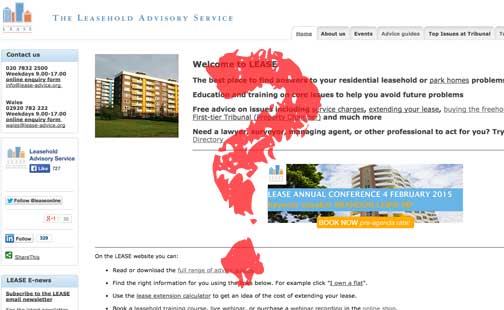The taxpayer-funded Leasehold Advisory Service organised its first wide-ranging “stakeholder” meeting last Thursday to understand how it can best get feedback from the sector.
LKP / Campaign against retirement leasehold exploitation would question why it wants this feedback in the first place, given that LEASE has said absolutely NOTHING about abuses in the sector and left this task entirely to organisations such as ours.
However, now that LEASE is under a “triennial review” from its civil service paymasters – and its purpose is being questioned – it is keen to be seen to be doing something. Under these circumstances, the choice of venue – the College of Emergency Medicine – could not have been more appropriate.
The stakeholders present could be categorised into three groups.
- Representatives of those who have a direct investment in leasehold properties represented by groups including LKP / Campaign against retirement leasehold exploitation, FPRA (Federation of Private Residents Associations), Engage Liverpool and Camden Council leaseholders, the National Landlords Association, the British Property Federation and A2 Domain Housing Association
- Representatives of those who provide support and services to the sector such Department of Communities and Local Government, Community Housing Cymru, the property tribunal and the Ministry of Justice, Law Society, Council of Mortgage Lenders, Building Societies Association, Right To Manage Federation, Housing Ombudsman, AgeUK and Shelter.
- And then there were stakeholders who represent those working in the sector: RICS, ARMA (Association of Residential Managing Agents), ARHM (Association of Retirement Housing Managers), IRPM (Institute of Residential Property Management) and ALEP (Association of Leasehold Enfranchisement Practitioners).
The main purpose for LEASE was to provide a forum for feedback on issues in the sector. It was made clear that the group was not intended to provide a focus for policy development, although DCLG may use information from the forum for that purpose.
As should be clear from the above list, the biggest problem is how to get better leasehold representations.
Other than ourselves, AgeUK and the FPRA, leaseholder input is limited to two local groups.
The sector has been far too happy with minimal leaseholder representation for too long. LEASE – and others – have relied excessively on advice from the organisations in group three.
This is not simply LKP /Campaign against retirement leasehold exploitation’s view. Shula Rich, of the Federation of Private Residents Associations, made the important point that LEASE also needs to feed back to the group what it sees as the key issues in the sector
Two very important topics were raised at the meeting.
Siobhan McGrath, president of the Property Tribunal, said that the MoJ intends to review the options for expanding the tribunals’ mediation services as a precursor or alternative to a full hearing.
All the leaseholder groups made clear that the preferred option is not to take cases to the tribunal unless you absolutely must.
LKP / Campaign against retirement leasehold exploitation is very much in favour of judicial mediation with one caveat: the settlement should remain in the public domain and not be subject to the sleazy compromise agreements that landlords like to impose.
Landlords (often through their voice the managing agent) may claim that this is to protect both parties, but the truth is that there is very rarely a reason for a leaseholder to want to keep matters confidential. 99.9% of the time it is the managing agent who wants to keep matters under wraps to hide the systemic issues which apply across their sites.
The group then went on to hear DCLG report on the status of the new compulsory redress scheme which came into force for all leasehold agents at the start of the month.
LKP has suggested that DCLG should set out clearly that there are now four redress schemes which a leaseholder may be able to use.
Redress systems
- Each agent is obliged to be registered with an Ombudsman Scheme. This is the simplest form or redress for what will almost always be low cost disputes, mostly linked to the services provided on your site.
- The Tribunal already does provide a mediation option in some areas and is looking to expend this service. Other than for very large disputes, this may well provide you with a better and quicker option to finding a solution with a “cooperative” managing agent / landlord / freeholder.
- The full Tribunal hearings. There will be certain sorts of cases where a formal judicial decision is needed and some cases where agreement between the parties may not be reached in mediation.
- Regulatory codes such as ARMA-Q, or the professional address procedures of the Solicitors Regulatory Authority, RICS ACCA ICAEW etc. These may only apply in cases involving breaches of professional standards, but they are another option for leaseholders. Complaints in extreme cases may go so far are resulting in the removal of an organisation or individual from a representative trade body
Those in the sector seem a little more concerned with the semantics of the issues and that the term “redress” may not be a strictly accurate way of describing the above. But from a leaseholders’ prospective that is exactly what the four systems offer.
It was announced at the meeting that LEASE Chair Deep Sagar will be leaving at the end of his current term.
Formal minutes of the meeting will appear soon.






 There she blows! Peverel’s Janet Entwistle is sailing for FirstPort. But is Capt’n Barbossa still on board?
There she blows! Peverel’s Janet Entwistle is sailing for FirstPort. But is Capt’n Barbossa still on board?





















